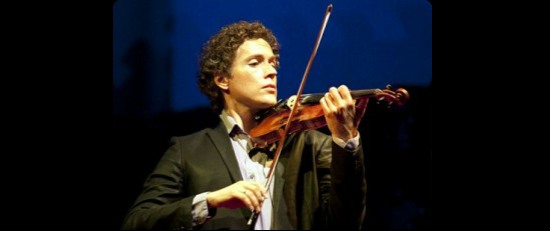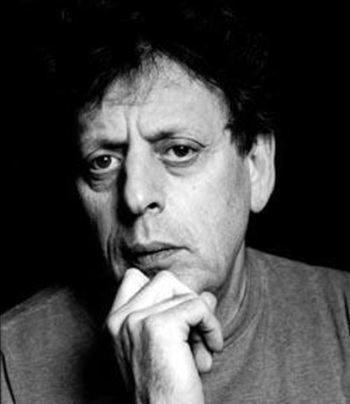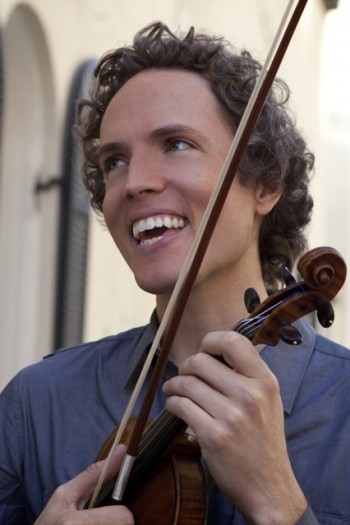With a winning smile and no visible effort, violinist heats Glass like a modern Paganini
 Review: Composer-pianist Philip Glass and violinist Tim Fain at the Ravinia Festival. ****
Review: Composer-pianist Philip Glass and violinist Tim Fain at the Ravinia Festival. ****
By Lawrence B. Johnson
No doubt the large crowd gathered June 23 at the Ravinia Festival’s Martin Recital Hall was drawn mainly by the prospect of seeing 75-year-old composer-pianist Philip Glass perform a program of his own music. And no doubt they came away delighted by the 90-minute sampler of Glass through the decades and his affable flair for story-telling.
But the brightest light on this evening was cast by the youthful, California-born violinist Tim Fain, who played – among other things — one prodigious movement from an unaccompanied suite that Glass has written for him. Fain’s performance of Glass’ Chaconne, its ambitious and technique-defying sweep clearly modeled on Bach, instantly tagged this tall, slender musician with the beaming smile as one of the authentic virtuosos of his generation.
 Fain, 35, who grew up in Santa Monica, Cal., and studied at the Curtis Institute of Music in Philadelphia and the Juilliard School in New York, is a familiar face at Ravinia, where attended the Steans Music Institute in 1996 and ’97. He made his festival debut in 2007 playing Glass’ “Book of Longing,” and appeared on Ravinia’s Rising Stars series the next year.
Fain, 35, who grew up in Santa Monica, Cal., and studied at the Curtis Institute of Music in Philadelphia and the Juilliard School in New York, is a familiar face at Ravinia, where attended the Steans Music Institute in 1996 and ’97. He made his festival debut in 2007 playing Glass’ “Book of Longing,” and appeared on Ravinia’s Rising Stars series the next year.
There’s a boyish brio about Fain that belies his maturity — no, his absolute mastery – as a violinist and musician. And I do make a distinction between the facets of whiz kid and poet. While Fain tossed off the most formidable demands of Glass’ Chaconne with almost casual ease, what really made his performance so appealing was its fundamental musicality – his embrace of the inherent poetry that again links Glass’ splendorous music to Bach’s.
 And yet I also confess that I sat gob-smacked by Fain’s sheer technical prowess, not only in the grandly arching Chaconne but also in Glass’ more Paganini-like “Knee Play No. 2” from this opera “Einstein on the Beach,” with its whirlwind spiccato sprints and sudden rhythmic shifts, all hurtling forward in unbounded perpetual motion. I suspect Paganini himself made just such an impression, one moment the demonic virtuoso capable of hellfire feats of prestidigitation and the next moment caressing his listeners with lyrical phrases of gossamer finesse.
And yet I also confess that I sat gob-smacked by Fain’s sheer technical prowess, not only in the grandly arching Chaconne but also in Glass’ more Paganini-like “Knee Play No. 2” from this opera “Einstein on the Beach,” with its whirlwind spiccato sprints and sudden rhythmic shifts, all hurtling forward in unbounded perpetual motion. I suspect Paganini himself made just such an impression, one moment the demonic virtuoso capable of hellfire feats of prestidigitation and the next moment caressing his listeners with lyrical phrases of gossamer finesse.
In his stage persona, Fain also cuts a figure of radical opposites – all smiles and engagement when he strides in to view, then all concentration first note to last, then the bright-eyed kid again, delighting in the knowledge of what he has just accomplished and soaking up his listeners’ joy in turn.
The virtuoso put his songful foot forward to great advantage in three movements from Glass’ suite “The Screens,” with the composer at the piano. In episodes titled “The Orchard,” “France” and “The French Lieutenant,” Fain drew out long lines of tremulous romanticism, the stuff of calming encores after the heady blistering of the Chaconne and “Knee” music.
Glass, for his part, recalled his minimalist journey with the hypnotic harmonic stasis of two solo piano pieces: “Mad Rush” and “Metamorphosis.” Also from his classic roots, he offered “Wichita Vortex Sutra,” his keyboard interaction with the recorded voice of Allen Ginsberg reciting verses about Middle America and unfettered youth — and unilaterally declaring an end to the Vietnam War!
Related Links:
- Tim Fain and Philip Glass talk and perform at the Metropolitan Museum of Art: View it on YouTube
- Glass’ Partita has been incorporated by Fain into a multimedia work called “Portals”: Read more about it
- Philip Glass on tour: View his concert calendar
- Tim Fain on tour: View his concert calendar
Tags: Phil Glass, Ravinia Festival, Tim Fain


No Comment »
2 Pingbacks »
[…] View Full Review Here – Lawrence B. Johnson, chicagoontheaisle.com […]
[…] View Full Review Here – Lawrence B. Johnson, chicagoontheaisle.com […]